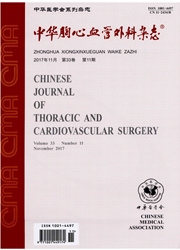

 中文摘要:
中文摘要:
目的 探讨一期矫治主动脉缩窄合并室间隔缺损的术后临床疗效.方法 回顾性研究2008年1月至2013年12月,行一期手术矫治主动脉缩窄合并室间隔缺损的婴幼儿,排除合并其他复杂心内畸形病例,共117例纳入研究.采用左胸后外侧联合胸骨正中切口和胸骨正中切口两种径路手术.患儿(婴)均由门诊收住院后随意分到不同手术组,该组外科医师据个人经验及喜好选择手术方式.按照手术径路分为两组.左胸后外侧联合胸骨正中切口(双切口)组54例,男38例(78.3%),女16例(21.7%);出生后30~225天,中位时间60天;体质量3.5~5.1 kg,中位值4.0 kg.胸骨正中切口径路(正中切口)组63例,男46例(76.2%),女17例(23.8%);出生后30~210天,中位时间90天;体质量3.6~5.2 kg,中位值4.2kg.随访截至2013年12月.结果 全组术后住院期间死亡9例(7.6%),双切口组与正中切口组差异无统计学意义(P =0.134).随着整体治疗水平的提高,住院病死率由2008年的23.5%下降到2013年的0.术后双切口组生存率96.2%,高于正中切口组88.9%,但组间差异无统计学意义(P=0.155).术后主要并发症包括术后吻合口再狭窄、主动脉瓣下狭窄和左支气管受压发生梗阻.Cox多因素回归分析示与术后死亡相关的因素为术中体外循环时间(HR=1.022,95%置信区间1.002~1.641,P=0.027)和术前主动脉弓发育不良(HR=3.765,95%置信区间1.193~ 11.878,P=0.024).结论 术前主动脉弓发育不良和体外循环时间是主动脉缩窄合并室间隔缺损一期矫治术后死亡的危险因素.需密切关注术后吻合口再狭窄、主动脉瓣下狭窄、左支气管受压发生梗阻对患儿(婴)远期生存的影响.
 英文摘要:
英文摘要:
Objective To review the effect of the repair on patients with coarctation of the aorta and ventricular septal defect.Methods Between January 2008 and December 2013,117 consecutive patients with coarctation of the aorta and ventricular septal defect underwent single-stage repair in our Institute.Those with the following conditions were excluded:associated congenital cardiac lesions,such as right atrial isomerism and single ventricle.Our center has two different surgical methods at present:the combination of the mid-sternal incision and thoracic lateral incision.The patients who were admitted to hospital form outpatient service were randomly subdivided to different operation group.The patients were subdivided to the combination of the mid-sternal incision and thoracic lateral incision group(54 cases,median age of 60 days,median body weight of 4.0 kg)and the mid sternal approach group(63 cases,median age of 90 days,median body weight of 4.2 kg) according to different operative procedures which were chosen from the experience and preference of the surgeon.Results The overall hospital mortality was 7.6% and there was no significant difference between the two groups.With the improving of perioperative management,the hospital mortality decreased from 23.5% in 2008 to 0 in 2013.The overall survival was higher in the combination of themidsternal incision and thoracic lateral incision group but there was no significant difference between the two groups (P =0.155).The main postoperative complication were subaortic stenosis,recoarctation and compression of left bronchus.The multivariable regression analysis showed that arch hypoplasia(HR =1.022,95% CI 1.002-1.641,P =0.027) and cardiopulmonary bypasstime (HR =3.765,95 % CI 1.193-11.878,P =0.024) were the risk factors for overall mortality.Conclusion The multivariable regression analysis showed that arch hypoplasia and cardiopulmonary bypass time were the risk factors for overall mortality.However,long-term outcomes remain of concern due to reco
 同期刊论文项目
同期刊论文项目
 同项目期刊论文
同项目期刊论文
 期刊信息
期刊信息
